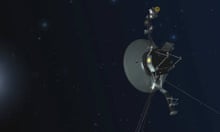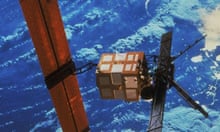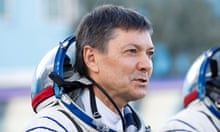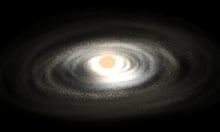The Russian segment of the International Space Station (ISS) has sprung its third coolant leak in under a year, raising new questions about the reliability of the country’s space programme even as officials said crew members were not in danger.
Flakes of frozen coolant spraying into space were seen in an official live feed of the orbital lab provided by Nasa on Monday, and confirmed in radio chatter between US mission control and astronauts.
“The Nauka module of the Russian segment of the ISS has suffered a coolant leak from the external (backup) radiator circuit, which was delivered to the station in 2012,” Russian space agency Roscosmos said on Telegram, adding temperatures remained normal in the affected unit.
Nauka, which means “science” in Russian and is also known as the Multipurpose Laboratory Module-Upgrade (MLM), launched in 2021.
US mission control in Houston could be heard asking astronauts on the American side to investigate.
“Hi, we’re seeing flakes outside, we need a crew to go to the cupola, we think windows five or six, and confirm any visual flakes,” an official said to the astronauts.
“There’s a leak coming from the radiator on MLM,” Jasmin Moghbeli replied later.
This is the third coolant leak to hit the Russian side of the ISS in less than a year. On 15 December 2022, dramatic Nasa TV images showed white particles resembling snowflakes streaming out of the rear of a docked Soyuz MS-22 spacecraft for several hours.
Speculation about the cause centred on an unlucky strike by a tiny space rock, or micro-meteor.
That spaceship returned to Earth uncrewed, and then another uncrewed Soyuz was sent to replace it a few months later. Two Russians and an American crew member had to stay for a year-long mission as a result, returning home only last month.
A similar leak in mid-February also affected the Russian Progress MS-21 cargo ship, which had been docked to the ISS since October 2022.
The succession of leaks lowers the probability they were caused by meteorites.
Space analyst Jonathan McDowell told AFP: “You’ve got three coolant systems leaking – there’s a common thread there. One is whatever, two is a coincidence, three is something systemic,” he said, speculating that a subcontractor company may be at fault.
“It really just emphasises the degrading reliability of Russian space systems. When you add it to the context of their failed moon probe in August, they’re not looking great.”
The Russian space sector, which has historically been the pride of the country, has been facing difficulties for years, between lack of funding, failures and corruption scandals.
The ISS is one of the few areas of continuing cooperation between Moscow and Washington since the start of the Russian offensive in Ukraine and the international sanctions that followed.










